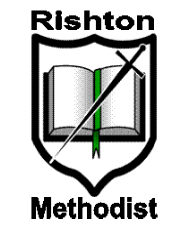Writing
At Rishton Methodist Primary School, we put English at the centre of every child’s learning. We recognise the significance of language, communication, reading and writing in all aspects of life, from developing independent learning skills to successfully entering the world of work. We place high-quality texts at the heart of our curriculum and encourage children to develop their love of reading through our Reading for Pleasure initiatives. Experiential learning opportunities and a vocabulary-rich learning environment feed directly into children’s writing outcomes.
The overarching aims of our English curriculum are to:
- Develop strong oracy skills that allow children to express themselves, communicating confidently across a range of contexts.
- Enable children to read fluently, widely and often, understanding a wide range of texts appropriate for their age.
- Enable children to draft, edit and present writing that is both technically proficient and creative, tailored to the demands of purpose and audience.
- Enable children to have a solid understanding of grammar and be able to spell new words by effectively applying the spelling patterns and rules they learn throughout their time in primary school.
- Encourage confidence and enjoyment in speaking, listening, reading and writing.
Underpinning our English curriculum are some core principles:
- Consciously builds on children’s existing language and literacy experiences.
- Recognises the importance of all those involved in the learning experience – parents and carers, wider family members, teachers and children.
- Values diversity and is culturally inclusive.
- Has high expectations of all children.
- Values and promotes critical enquiry.
- Offers challenge but provides models, demonstrations, examples and scaffolds to help children tackle them successfully.
All aspects of our English curriculum are interrelated, and progress in one area is supported by development in each of the others. At Rishton Methodist Primary, we acknowledge the strong reciprocal relationship between speaking, listening, reading and writing.
At Rishton Methodist Primary School we believe that all pupils can achieve in Writing. We do not put ceilings on what pupils can achieve and we do not hold pre-conceptions about any pupils’ ability to make progress. We believe through writing, pupils will have a chance to develop culturally, emotionally, intellectually, socially and spiritually. We feel that writing enables pupils both to acquire knowledge and to build on what they already know.
In the Early Years, children start their writing journey through their play, mark making for a range of different purposes, for example writing shopping lists and making cards for loved ones, as well as learning to write their name. They begin to develop their fine motor skills so that they can use mark making tools appropriately. In Reception, they learn the individual letters and sounds and begin to develop their letter formation. They use these emerging skills to write phonetically plausible words, phrases and simple sentences in a range of contexts. Alongside this we focus strongly on language development and oracy skills – if they can’t say it, they can’t write it! We give the children memorable experiences and rich, high quality texts and ensure there is an audience and purpose for the writing process.
Throughout Key Stage 1, the link between reading and writing continues to be reinforced. The children’s oracy skills are developed further through a wide variety of opportunities to discuss, verbalise and refine their ideas, for example through role play, paired talk, drama and hot seating. This prepares them for the writing process. Alongside this, the children learn about the structure and organisation of a variety of genres. Shared and modelled writing provides an opportunity for teachers to demonstrate the writing process. Children will then use their developing phonic knowledge within their writing, before editing and redrafting their work. Motivation is enhanced by encouraging children to write for a range of purposes and audiences, including opportunities to publish their writing. Children are taught to develop the foundations of a fast, accurate and efficient handwriting style.
As they move into Key Stage 2, children are taught the age-related statutory spellings, spelling patterns, and spelling rules from the National Curriculum. The teaching sequence for each spelling focus is: revise, teach, practice, apply. Pupils are encouraged to practice sentence combining and other sentence construction techniques. A fluent writing style supports composition, therefore handwriting is explicitly taught. There is a whole-school structured approach to teaching vocabulary in the classroom. This is focused on whole class learning but is accessible to all children.
Children follow a structured approach to the writing process which begins with the deconstruction of a model text. Key grammatical structures are identified and relevant skills are taught through shared and modelled writing. Children then apply their learning through the process of planning, drafting, sharing, evaluating, revising, editing and publishing. Children are given opportunities to write effectively for a range of purposes and audiences selecting language, appropriate grammatical structures and cohesive devices that show a good awareness of the reader. Children working at greater depth are encouraged to exercise conscious control over levels of formality including the manipulation of grammar and vocabulary in order to demonstrate the appropriate register. High-quality literary texts are available to all learners. The scope and depth of the literature inspires high standards for all through a mastery approach to learning and love of language in all its forms.
